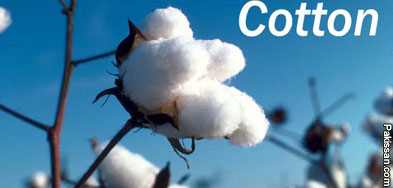Sliding cotton prices
By
Ahmad Fraz Khan
 The
cotton prices need some kind of support to stabilise. With
the momentum in crop arrival in the market, its price,
following the international trend, has started sliding.
The
cotton prices need some kind of support to stabilise. With
the momentum in crop arrival in the market, its price,
following the international trend, has started sliding.
If the trend is not arrested, the growers will be badly hit
by falling prices as well as output losses.
The cotton anatomy differs from other crops. It does not get
mature to its full potential at any single stage of its
cycle as wheat or rice do. Rather, it keeps yielding
additional production with the passage of time from the same
bolls. Precisely for this reason, market prices play crucial
role in determining final yield.
If the market is on the higher side, the farmers wait till
the last moment, keep picking and adding to national
production. But if the rates drop, the farmers normally
terminate the crop early and go for other options,
especially wheat.
This makes a huge difference in the final production
figures.
He said his 300-tonne edible oil and ghee manufacturing
factory at Port Qasim would start production next month,
adding that after six months the factory’s entire demand
would be met by CPO refinery he is going to set up there.
In 1990s there was just one palm oil refinery in the country
but now about a dozen are in operation.
Industry sources say one of the reasons for expanded import
volumes of palm oil in the last fiscal year is that the oil
and ghee industry not only caters to domestic demand but a
large quantity of these items is exported to Afghanistan.
“Previously Pakistani ghee and edible oil used to be
smuggled to Afghanistan through misuse of Afghanistan
Transit Trade Agreement but lately tightening of the rules
of ATTA has put a stop on it,” claimed an industry official.
According to Vice Chairman of Pakistan Edible Oil Refiners’
Association, Rasheed Janmohammad the import bill of palm oil
can be reduced drastically by increasing the output of
oilseeds and by enhancing the capacity of edible oil
refineries and solvent extraction plants. Pakistan’s total
requirement of edible oil is close to three million tonnes
of which 75 per cent plus is imported and the rest is met
domestically. Solvent extraction plants produce soft oil
using seeds of sunflower, cotton and canola as well as
rapeseeds and mustard etc. In the last fiscal year, total
output of oilseeds was below 700,000 tonnes.
Officials of edible oil industry say after the devolution of
the affairs of agriculture ministry to the provinces from
this fiscal year, production of edible oil ought to go up
with decentralised implementation of policies.
In addition to boosting output of traditional oilseeds there
is a need to focus on using coconut plantations in Sindh and
expanding the experimental plantation of olive in
Balochistan and Potohar region, say edible oil industry
officials.
Last year, a scientific research department of Karachi
University had identified 100 local species of wild plants
that can be used for extracting edible oils of different
kinds. “There is a need to start experimenting on such
plants and see if we can really get results,” said a senior
official of Sindh’s Agriculture Department.
Agriculture scientists say that cottonseeds account for
roughly 50 per cent of the domestic edible oil production
followed by sunflower (30 per cent) whereas the remaining 20
per cent oil is obtained from canola, rapeseeds and mustard.
They point out that per acre yields of all these oilseed
crops ranges between 15-45 per cent of potential primarily
due to water scarcity and lack of the use of latest
technology and farming techniques. Besides, crop losses at
the time of harvesting and losses in oilseed stocks due to
poor storage, preservation and processing during oil
extraction also lowers the per unit output of oil
extraction. Provincial governments will now have to address
these and other structural issues to make the edible oil
extraction industry more efficient.
In the past few years, increased income levels in rural
areas has encouraged industrialists to set up solvent
extraction plants to cater to the growing demand of cooking
oil and ghee across the country in general and in the rural
areas in particular.
“Until recently most solvent extraction plants were set up
in Punjab. But industrialists now prefer to establish such
plants in the industrial zone at Port Qasim and in other
industrial areas of Karachi,” said a leading edible oil
extractor.
“The reason is the cost of using imported oilseeds in the
port city of Karachi is lower than what it could be
elsewhere in the country. And it is also easier to export
oilseed meals (or what is left over of oilseeds after oil
extraction) from Karachi.”
Courtesy: The DAWN